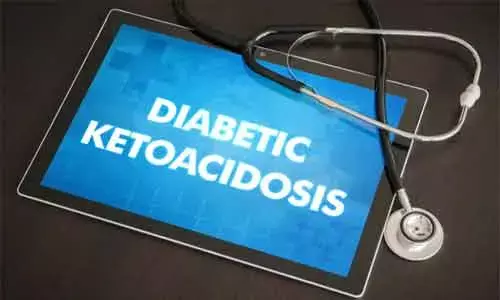- Home
- Medical news & Guidelines
- Anesthesiology
- Cardiology and CTVS
- Critical Care
- Dentistry
- Dermatology
- Diabetes and Endocrinology
- ENT
- Gastroenterology
- Medicine
- Nephrology
- Neurology
- Obstretics-Gynaecology
- Oncology
- Ophthalmology
- Orthopaedics
- Pediatrics-Neonatology
- Psychiatry
- Pulmonology
- Radiology
- Surgery
- Urology
- Laboratory Medicine
- Diet
- Nursing
- Paramedical
- Physiotherapy
- Health news
- Fact Check
- Bone Health Fact Check
- Brain Health Fact Check
- Cancer Related Fact Check
- Child Care Fact Check
- Dental and oral health fact check
- Diabetes and metabolic health fact check
- Diet and Nutrition Fact Check
- Eye and ENT Care Fact Check
- Fitness fact check
- Gut health fact check
- Heart health fact check
- Kidney health fact check
- Medical education fact check
- Men's health fact check
- Respiratory fact check
- Skin and hair care fact check
- Vaccine and Immunization fact check
- Women's health fact check
- AYUSH
- State News
- Andaman and Nicobar Islands
- Andhra Pradesh
- Arunachal Pradesh
- Assam
- Bihar
- Chandigarh
- Chattisgarh
- Dadra and Nagar Haveli
- Daman and Diu
- Delhi
- Goa
- Gujarat
- Haryana
- Himachal Pradesh
- Jammu & Kashmir
- Jharkhand
- Karnataka
- Kerala
- Ladakh
- Lakshadweep
- Madhya Pradesh
- Maharashtra
- Manipur
- Meghalaya
- Mizoram
- Nagaland
- Odisha
- Puducherry
- Punjab
- Rajasthan
- Sikkim
- Tamil Nadu
- Telangana
- Tripura
- Uttar Pradesh
- Uttrakhand
- West Bengal
- Medical Education
- Industry
Cannabis use in type 1 diabetes may lead to ketosis, be wary of misdiagnosis: Study

Aurora, CO: Type 1 diabetes (T1D) patients presenting with diabetic ketoacidosis (DKA) have higher bicarbonate levels and pH following cannabis use versus those not using cannabis, according to recently published data. So, in the patients having DKA and higher pH, especially pH ≥7.4, cannabis use should be considered in the differential diagnosis. The study appears in the journal Diabetes Care.
T1D patients presenting with DKA symptoms may instead have ketosis due to cannabis hyperemesis syndrome, and misdiagnosis can be avoided by adopting several criteria, the researchers note.
Mostly, physicians rely on PH and bicarbonate levels for diagnosing and classifying DKA and making floor vs. ICU admission decisions. In the study, the researchers found that relying only on these parameters (pH and bicarbonate) can be misleading in cannabis users with type 1 diabetes.
The objective of the study conducted by Halis Kaan Akturk, Barbara Davis Center for Diabetes, University of Colorado, Aurora, CO, and colleagues was to differentiate diabetic ketoacidosis from hyperglycemic ketosis due to cannabis hyperemesis syndrome (HK-CHS) in adults with type 1 diabetes.
For this purpose, the researchers analyzed 68 patients with 172 DKA events out of 295 adults with type 1 diabetes who were seen with DKA-related ICD-10 codes. Cannabis use was defined as a positive urine test result for cannabis.
HK-CHS (pH ≥7.4 with bicarbonate ≥15 mmol/L [mEq/L]) was defined using linear mixed models, and sensitivity and specificity were calculated using the receiver operating characteristic (ROC) curve.
Key findings include:
- Cannabis users had significantly higher pH (7.42 ± 0.01 vs. 7.09 ± 0.02) and bicarbonate (19.2 ± 0.61 vs. 9.1 ± 0.71 mmol/L) compared with nonusers.
- The area under the ROC curve for a positive cannabis urine test result predicting HK-CHS was 0.9892.
To conclude, cannabis use should be considered in the differential diagnosis, in patients who present with DKA and higher pH, especially pH ≥7.4.
Reference:
Halis Kaan Akturk, Janet Snell-Bergeon, Gregory L Kinney, Anagha Champakanath, Andrew Monte, Viral N. Shah; Differentiating Diabetic Ketoacidosis and Hyperglycemic Ketosis Due to Cannabis Hyperemesis Syndrome in Adults With Type 1 Diabetes. Diabetes Care 2021; dc211730. https://doi.org/10.2337/dc21-1730
Dr Kamal Kant Kohli-MBBS, DTCD- a chest specialist with more than 30 years of practice and a flair for writing clinical articles, Dr Kamal Kant Kohli joined Medical Dialogues as a Chief Editor of Medical News. Besides writing articles, as an editor, he proofreads and verifies all the medical content published on Medical Dialogues including those coming from journals, studies,medical conferences,guidelines etc. Email: drkohli@medicaldialogues.in. Contact no. 011-43720751


